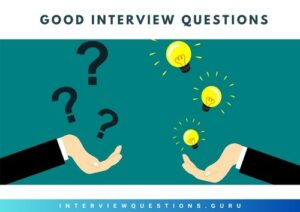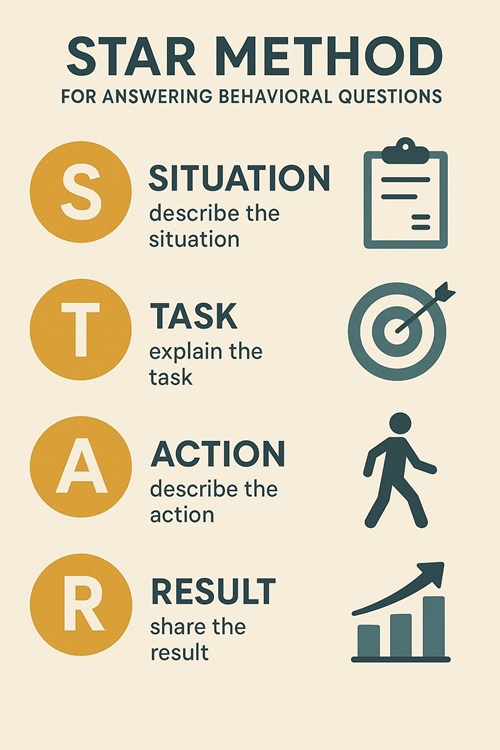Hiring the right candidate can make or break your team’s success. Whether you’re a seasoned HR professional or a small business owner conducting your first interview, asking good interview questions is the key to uncovering a candidate’s true potential. But what makes a question “good”? It’s one that reveals not just skills and experience but also cultural fit, problem-solving ability, and long-term potential. In this ultimate guide, we’ll share 75+ good interview questions across categories, expert tips to tailor them to your needs, and strategies to ensure you hire top talent in 2026. Let’s dive in!
Table of Contents
Why Good Interview Questions Matter
The right questions help you evaluate candidates beyond their resumes. Poorly chosen questions waste time and fail to uncover critical insights, while good interview questions provide a window into a candidate’s thought process, values, and ability to thrive in your organization.
- Reveal True Competence: Assess technical skills, soft skills, and adaptability.
- Gauge Cultural Fit: Ensure alignment with your company’s values and team dynamics.
- Predict Future Success: Identify problem-solvers and candidates with growth potential.
According to McGill University Research, structured interviews with consistent questions improve hiring accuracy.
Types of Good Interview Questions
To build a comprehensive interview, you need a mix of question types. Below, we break down the key categories and provide examples to help you create a balanced, effective interview process.
Behavioral Interview Questions
Behavioral questions explore how candidates handled situations in the past, offering insight into their problem-solving, teamwork, and decision-making skills. These are based on the premise that past behavior predicts future performance.
What to Ask:
- Tell me about a time you faced a challenging deadline. How did you prioritize tasks?
- Describe a situation where you resolved a conflict with a colleague. What was the outcome?
- Share an example of when you went above and beyond for a customer or client.
- Tell me about a time you failed. How did you handle it, and what did you learn?
- How have you adapted to a major change in your workplace, such as new technology?
- Describe a time you led a team through a difficult project. What was your approach?
- Share an instance where you had to persuade someone to see your point of view.
- Tell me about a time you received constructive feedback. How did you respond?
- Describe a situation where you had to work with a difficult manager. How did you handle it?
- Share an example of when you improved a process or workflow.
- Tell me about a time you worked under pressure. How did you stay focused?
- Describe a moment when you had to make a tough ethical decision.
- Share a time you took initiative without being asked.
- Tell me about a project where you collaborated with a diverse team.
- Describe a time you mentored or trained a colleague.
- Share an example of when you exceeded expectations on a task.
- Tell me about a time you had to manage conflicting priorities.
- Describe a situation where you turned a negative outcome into a positive one.
- Share a time you handled a high-stakes presentation or meeting.
- Tell me about a time you adapted your communication style to suit your audience.
Why It Works:
Behavioral questions reveal how candidates think on their feet and handle real-world scenarios.
Situational Interview Questions
Situational questions present hypothetical scenarios to gauge how candidates would approach challenges in your workplace.
What to Ask:
- If you were assigned a project with unclear instructions, how would you proceed?
- How would you handle a team member who consistently misses deadlines?
- If a client was unhappy with your work, how would you address their concerns?
- Imagine you have two competing priorities with tight deadlines. How would you manage them?
- How would you pitch a new idea to a skeptical manager?
- If you noticed a colleague struggling, how would you offer support?
- How would you handle a situation where a project is falling behind schedule?
- If you were asked to take on a task outside your expertise, what would you do?
- How would you respond if a coworker took credit for your work?
- Imagine a key team member leaves mid-project. How would you adjust?
- How would you handle a customer who demands a solution you can’t provide?
- If you disagreed with your manager’s decision, how would you approach it?
- How would you prioritize tasks during a company-wide crisis?
- If you were leading a team remotely, how would you ensure collaboration?
- How would you introduce a new process to a resistant team?
- If you had to deliver bad news to a client, how would you handle it?
- How would you manage a project with limited resources?
- If a stakeholder changes project requirements last minute, what would you do?
- How would you motivate a disengaged team member?
- If you were tasked with training a new hire, how would you structure their onboarding?
Why It Works:
These questions test problem-solving and critical thinking in context-specific scenarios.
Technical Interview Questions
For roles requiring specific skills, technical questions assess a candidate’s expertise and ability to apply knowledge.
What to Ask (Tailor to Role):
For a Developer
- Can you walk me through your process for debugging a complex code issue?
- How do you ensure your code is clean and maintainable?
- Explain a complex algorithm you’ve implemented recently.
- How do you optimize code for performance?
For a Marketer
- How would you measure the ROI of a digital marketing campaign?
- What’s your process for optimizing a landing page for conversions?
- How do you identify the right audience for a campaign?
- Explain how you’d use A/B testing to improve ad performance.
For a Sales Role
- Describe your approach to closing a deal with a hesitant prospect.
- How do you qualify leads before pursuing them?
- What’s your strategy for upselling existing clients?
- How do you handle objections during a sales pitch?
For a Data Analyst
- Explain how you’d clean a messy dataset before analysis.
- How do you choose the right visualization for a dataset?
- Describe a time you used data to influence a business decision.
- What tools do you use for statistical analysis?
Project Manager
- How do you use tools like Jira or Trello to manage workflows?
- How do you handle scope creep in a project?
- Describe your approach to risk management.
- How do you ensure stakeholder alignment?
Why It Works: Technical questions confirm a candidate’s ability to perform job-specific tasks.
Culture Fit and Values-Based Questions
Ensuring a candidate aligns with your company’s mission and values is critical for long-term success.
What to Ask:
- What type of work environment helps you thrive?
- How do you stay motivated when working on repetitive tasks?
- What does teamwork mean to you, and how have you contributed to it?
- Describe a time you upheld a company’s values in a difficult situation.
- Why are you excited about working with our organization specifically?
- How do you balance work and personal well-being?
- What role does feedback play in your professional growth?
- Describe a time you championed diversity or inclusion in the workplace.
- How do you handle disagreements about company priorities?
- What’s your approach to building trust with new colleagues?
- How do you stay aligned with a company’s mission in your daily work?
- Describe a time you took accountability for a mistake.
- What inspires you to stay with a company long-term?
- How do you contribute to a positive workplace culture?
- What values are most important to you in a workplace?
Why It Works: These questions reveal whether a candidate will mesh with your team and uphold your company’s mission.
How to Ask Good Interview Questions Effectively
Crafting great questions is only half the battle. How you ask them and evaluate responses is just as important. Here’s how to maximize their impact:
- Use a Structured Interview Process:
- Ask the same core questions to all candidates for consistency.
- Score responses on a standardized rubric to reduce bias.
- Encourage Detailed Responses:
- Prompt candidates to use the STAR method (Situation, Task, Action, Result) for behavioral questions.
- Ask follow-up questions like, “Can you elaborate?” or “What was the impact?”
- Tailor Questions to the Role:
- Customize questions to reflect the specific challenges of the position.
- For leadership roles, focus on strategic thinking and team management.
- Balance Open-Ended and Specific Questions:
- Open-ended questions spark discussion, while specific ones test expertise.
- Create a Comfortable Environment:
- Start with icebreaker questions to put candidates at ease, like, “Tell me about yourself” or “What inspired you to apply for this role?”
Sample Interview Question Frameworks by Role
To make it easier, we’ve compiled frameworks for good interview questions tailored to common roles. Use these as a starting point and adapt them to your organization’s needs.
For Software Developers
- Technical:
- How do you ensure your code is clean and maintainable?
- Can you explain a complex algorithm you’ve implemented recently?
- Behavioral:
- Describe a time you had to refactor code under tight deadlines.
- Tell me about a time you collaborated with a non-technical team member.
- Situational:
- How would you handle a critical bug discovered just before a product launch?
For Marketing Professionals
- Technical:
- How do you optimize a landing page for conversions?
- What metrics do you prioritize in a social media campaign?
- Behavioral:
- Share an example of a campaign that didn’t meet expectations. How did you pivot?
- Situational:
- How would you market a product with a limited budget?
For Customer Service Roles
- Technical:
- How do you use CRM tools to track customer interactions?
- What’s your process for handling an escalated customer complaint?
- Behavioral:
- Tell me about a time you turned an unhappy customer into a loyal one.
- Situational:
- How would you handle a customer who demands a refund you can’t provide?
Common Mistakes to Avoid When Asking Interview Questions
Even the best questions can fall flat if you make these common mistakes:
- Asking Leading Questions: Avoid questions that suggest the “right” answer, like, “You’re good at time management, right?”
- Focusing Only on Skills: Don’t neglect culture fit or soft skills.
- Ignoring Red Flags: Pay attention to vague or rehearsed answers.
- Overloading Candidates: Limit questions to 8-12 per interview to avoid fatigue.
- Skipping Follow-Ups: Dig deeper into responses to uncover insights.
Advanced Tips for Crafting Your Own Good Interview Questions
Want to create custom questions that stand out? Follow these expert strategies:
- Align with Company Goals:
- If innovation is a priority, ask, “How have you driven innovation in past roles?”
- For customer-focused companies, ask, “How do you anticipate customer needs?”
- Test for Growth Potential:
- Ask, “Where do you see yourself in this role in two years?”
- Or, “What skills are you eager to develop in this position?”
- Incorporate Real-World Scenarios:
- Present a challenge your team faces and ask, “How would you approach this?”
- Use Role-Playing:
- For sales roles, ask candidates to pitch your product on the spot.
- For leadership roles, simulate a team conflict and ask how they’d resolve it.
Conclusion
Asking good interview questions is an art and a science. By combining behavioral, situational, technical, and culture fit questions, you can uncover the skills, values, and potential of every candidate. Use the 75+ questions and frameworks in this guide to build a structured, insightful interview process that helps you hire top talent in 2026. Start implementing these strategies today, and explore our 21 Must-Know Q&As to Ace Any Job.


